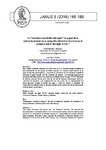La “novelera condición del siglo”: el papel de la industria teatral en la recepción del teatro barroco en la primera mitad del siglo XVIII

Use this link to cite
http://hdl.handle.net/2183/24270
Except where otherwise noted, this item's license is described as Atribución-NoComercial-SinDerivadas 4.0 España
Collections
Metadata
Show full item recordTitle
La “novelera condición del siglo”: el papel de la industria teatral en la recepción del teatro barroco en la primera mitad del siglo XVIIIAlternative Title(s)
"Imaginative condition century": the role of theatrical industry on receptation of baroque theatre in the first half of the 18th centuryAuthor(s)
Date
2016Citation
Bermejo Gregorio, J. (2016). La “novelera condición del siglo”: el papel de la industria teatral en la recepción del teatro barroco en la primera mitad del siglo XVIII. Janus: estudios sobre el Siglo de Oro, 5, 166-185. https://www.janusdigital.es/articulo.htm?id=73
Abstract
[Resumen] Este trabajo pretende descubrir el poder que tuvo la industria teatral mediante la mercantilización de las piezas de teatro popular. La continua especulación de la espectacularidad escenográfica y musical en detrimento de la dimensión dramática manipuló el gusto popular por las comedias de aparato. Pero también tergiversó la recepción del teatro barroco por parte de sus defensores en el siglo XVIIII. Mediante el análisis y estudio de las opiniones de uno de los últimos dramaturgos barrocos -Antonio de Zamora- y la comparación con los juicios de un representante del tradicionalismo durante la mitad del siglo -Tomás de Erauso y Zabaleta- se comprobará la influencia de la industria teatral en las posiciones de las discusiones sobre el teatro dieciochesco [Abstract] This paper discovers the power that the theatrical industry had through the mercantilitation of popular theatre. The continual speculation of scenic and musical spectacle –at the expense of dramatic dimension– manipulated the popular taste for great comedies. However it also distorted the reception of Baroque theatre of its defenders in the middle of the 18th century. The comparison between the opinions of one of the last baroque playwright’s opinions -Antonio de Zamora- and the judgments of a traditionalism representative -Tomás de Erauso y Zabaleta- will verify the influence of the theatrical industry in the positions of the discussions on the 18th’s theatre
Keywords
Teatro popular del Siglo XVIII
Industria teatral
Recepción del teatro barroco
Antonio de Zamora
Tomás Erauso y Zabaleta
Popular theatre of XVIIIth century
Theatrical industry
Theatre Baroque reception
Industria teatral
Recepción del teatro barroco
Antonio de Zamora
Tomás Erauso y Zabaleta
Popular theatre of XVIIIth century
Theatrical industry
Theatre Baroque reception
Editor version
Rights
Atribución-NoComercial-SinDerivadas 4.0 España
ISSN
2254-7290






